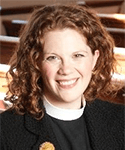These are the things I inherited at the Massachusetts Council of Churches: one nearly empty bottle of Heaven Hill whiskey; a strong perception that our Boston office could not find anything in the state west of Worcester; an intra-Christian dialogue meeting on the first Tuesday of every month, except January; and a “yelling mailbox.”
Some of the inheritance was visible. Other institutionally inherited items came through oral traditions. I learned of the yelling mailbox from a past president.
“We had an agreement,” he said. “The head of the local Jewish organization and I would agree to meet at the designated mailbox on Tremont Street whenever things got hot in the Middle East. We would yell. We would say things we couldn’t say back in our own shops. Then we would go back to our separate offices, never repeating what we had just heard.”
Serving in institutional ministry means I did not need to come up with the yelling mailbox. My colleague and I just needed to follow the paths of our predecessors, adapt the pattern to our own times and meet at the mailbox.
I did not intend to go into institutional ministry. I went to seminary presuming I would serve a local congregation. I came to work at a council of churches because of my own history of formation by multiple, divided Christian communities.
But I fit into institutional life. My fondness for playing with the interlocking components of systematic theology found a new expression in the interlocking systems of denominational relations. I believe that a well-run church meeting can echo the divine ordering of creation.
In retrospect, it’s easy to see how my life was formed by many institutions: the public schools I attended, the public library that gave me my first job, the four newspapers delivered to our house every day while I was growing up. I moved easily into the ordered, dependable patterns of institutional ministry.
Christian institutions can serve a similar function as our liturgies, giving us patterns to hold our longing. Theologian L. Gregory Jones writes, “Christian institutions give form and structure to our convictions, enabling us to cultivate thriving communities to be signs, foretastes and instruments of the reign of God.” Institutions offer a way for our aspirations to find permanency.
As individuals, we may befriend another Christian across divided denominations, but sustainable change comes when the denominational institutions restructure to reflect this unity. At their best, institutions offer a stability that ensures we don’t keep having to fight the same battles again and again.
Institutions also can offer a corrective to free-agent leaders. Twice now I’ve been a member of a church where the actions of the leader went unchecked for a time by the institutional oversight. Corruption is not limited to institutional bureaucracy. Here my Reformed tendencies kick in: I still believe we are all corruptible, flawed humans who need communal oversight and divine grace to reform our own distorting tendencies.
No doubt the church has used its institutional authority to distort and oppress. Yet I trust communally agreed-upon practices that have been filtered through the graces and flaws of many people over the generations.
I hit a turning point after five years of institutional ministry. For the first five years, I worked well in my bureaucratic role. I believed in the reconciling mission of our institution, but I did not always view my work as ministry.
In 2009, when I was the associate director, I took a leave of absence to complete clinical pastoral education in preparation for ordination. I realized two things when I returned to my institution: first, I was able to claim my role as a pastoral presence, not just an ecclesial bureaucrat. I saw the committees I staffed in a new light; this was my congregation.
Second, somewhat unsurprisingly, the institution was still there when I returned. I was not so indispensable that the institution couldn’t run without me. Many 12-step recovery programs talk about getting “right-sized,” not too big and not too small. Serving in an institution helps keep me right-sized. We are important in the institutional life, but the institution is not dependent upon us.
During seminary, I began to visit the brothers at the Society of St. John the Evangelist. The repeated prayers carved a channel, so that even when not in their sanctuary, I could feel the prayers course through me. Even when I did not attend in person, I knew the brothers prayed.
We who serve the church lead in a time of deep institutional suspicion. We attend to the paradoxical reality that our institutions are vulnerable even as people assume they will be ever-present. The gift of serving a Christian institution is that I get to keep the big, audacious goal before me: full, visible unity of the body of Christ.
Jones quotes Hugh Heclo saying, “Institutional thinking has to do with living committed to the ends for which organization occurs rather than to an organization as such.” I am called to further our end. The institution is a means to do so, but not the goal itself.
I also see that serving a Christian institution places me in the right position relative to my Creator. I do not make things out of nothing; God does. My aim is to adapt what I’ve inherited to continually reshape us as a vibrant institution.
I rejoice that the obligation is not on me to create the “yelling mailbox” and other practices of institutional life ex nihilo. Instead, I blessedly inherit a wealth of traditions ready to be reshaped and to reform our institution for our new age.









